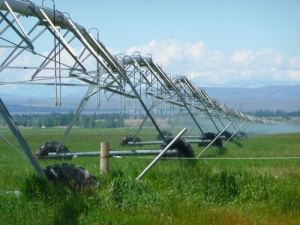Australian teams to help repair North Canterbury irrigators after storm
Moves are afoot to get a team of Australians over here to help repair North Canterbury's irrigation machinery, ravaged by the big windstorm of late October.
 Irrigation is not solely about dairying; it supports a variety of land uses including viticulture, horticulture, cropping and sheep and beef.
Irrigation is not solely about dairying; it supports a variety of land uses including viticulture, horticulture, cropping and sheep and beef.
IrrigationNZ has hit back at a call for a five-year ban on new irrigation schemes.
It says irrigation is not solely about dairying; it supports a variety of land uses including viticulture, horticulture, cropping and sheep and beef.
Pastoral-based activities make up approximately three quarters of our irrigated area (dairy 50% and sheep and beef finishing 25%). The other 25% of irrigation supports predominately vegetable and arable crops alongside fruit and wine growing.
In a radio report, the Tourism Export Council (TEC) called for a 5 year ban on new irrigation schemes.
IrrigationNZ says without irrigation, the tourism industry would not be able to promote the food and wine packages it offers in regions such as Hawke's Bay, Marlborough and Central Otago. These growers are only able to produce quality vintages and products with the support of reliable water.
In 2012, it was estimated that irrigated farms provided a $2.7billion contribution to New Zealand's economy, and more than double this in terms of the benefits to the wider community. Irrigated agriculture underpins many of the provincial economies on the east coast of New Zealand. Towns like Hastings, Blenheim, Ashburton, Timaru, Oamaru, Cromwell and Alexandra would be far less vibrant and resilient without irrigation.
IrrigationNZ says irrigation actually benefits tourism because the renewed vitality of these rural centres has created openings for tourism.
Currently New Zealand only abstracts around 2% of its water resource (if hydropower is included this rises to about 5%).
Irrigation accounts for approximately 60% of this and by international standards our general abstraction rate is very low.
The worldwide precipitation average is 800mm per annum but New Zealand receives in excess of 2000mm per annum, which is two and a half times more rainfall. Taking both our abstraction and precipitation rates into account, New Zealand is definitely a water-rich country.
More information about the current state of play in New Zealand's irrigation sector can be found in the 2015 New Zealand Irrigation Snapshot at http://irrigationnz.co.nz/wp-content/uploads/INZ-IrrigationIndustrySnapshot-4Nov15.pdf
Former Agriculture Minister and Otaki farmer Nathan Guy has been appointed New Zealand’s Special Agricultural Trade Envoy (SATE).
Alliance Group has commissioned a new heat pump system at its Mataura processing plant in Southland.
Fonterra has slashed another 50c off its milk price forecast as global milk flows shows no sign of easing.
Meat processors are hopeful that the additional 15% tariff on lamb exports to the US will also come off.
Fears of a serious early drought in Hawke’s Bay have been allayed – for the moment at least.
There was much theatre in the Beehive before the Government's new Resource Management Act (RMA) reform bills were introduced into Parliament last week.
President Donald Trump’s decision to impose tariffs on imports into the US is doing good things for global trade, according…
Seen a giant cheese roll rolling along Southland’s roads?